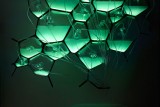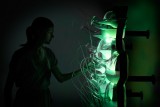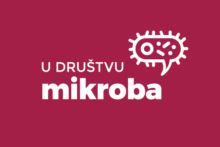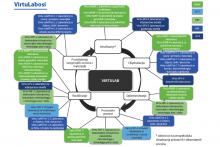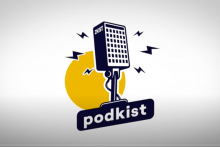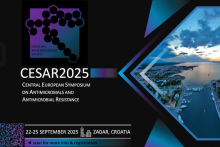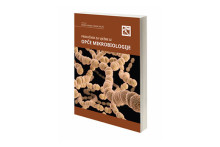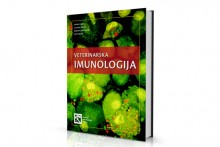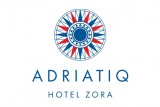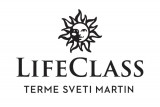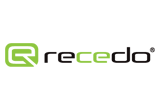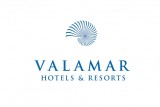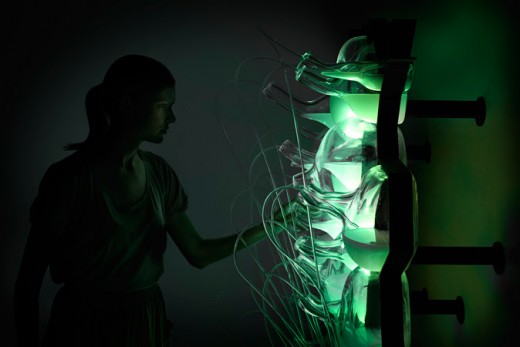
Bio-light: different biological technologies to create ambient light effects
The bio-light is a concept that uses different biological technologies to create ambient light effects. It explores the use of bioluminescent bacteria, which are fed with methane and composted material (drawn from the methane digester in the Microbial Home system). Alternatively the cellular light array can be filled with fluorescent proteins that emit different frequencies of light.
Dutch electronics company, Phillips has created Bio-light, the greener lighting system that is part of their Microbial Home (MH) system. The bioluminescent bacteria, which flourishes on waste generated in the average home, is housed in hand-blown glass cells, clustered together to form a lamp that could easily be displayed in a modern art museum.
Each cell is joined to the lamp’s reservoir base by thin silicon tubes that pipe methane gas from composted bathroom solids and vegetable scraps via a kitchen dodad that digests bio-waste.
Till the time proper nutrients are supplied, the bio-light’s living bacteria can be powered indefinitely. Although the light is not bright enough to fully replace conventional lighting, it does make people conscious of household forms of wasted energy that could be tapped.
“Designers have an obligation to understand the urgency of the situation, and translate humanity’s needs into solutions,” the Discovery News quoted Clive van Heerden, Senior Director of Design-led Innovation at Philips Design, as saying on the website.
“Energy-saving light bulbs will only take us so far. We need to push ourselves to rethink domestic appliances entirely, to rethink how homes consume energy, and how entire communities can pool resources,” Heerden added.
Galerija slika
Mogućnosti zapošljavanja
National Institute of Biology Announces Fully Funded PhD Position in Viromics
Rok za prijavu: 06.06.2025
Projekt "U Društvu mikroba"
Osnovna svrha projekta je doprinijeti uvođenju, razvoju i održivosti programa društveno korisnog učenja na fakultetima. Više o projektu
Zanimljivosti
Projekt Virtulab
VIRTULAB je virtualno umrežen znanstveno-istraživački laboratorij za primarne i sekundarne sirovine.Naša članica, prof. dr. sc. Dijana Škorić u podkistu o koronavirusu i cjepivu
Podkist je podcast Zavoda za komunikacijske i svemirske tehnologije (ZKIST) u kojem se razgovara o znanstvenim i tehnološkim temama te temama povezanim sa studiranjem i učenjem. Cilj je u opuštenoj atmosferi približiti najnovija znanstvena istraživanja široj publici, dati studentima širi pogled na to što uče te poslušati savjete starijih kolega o studiranju, radu i napredovanju u profesionalnoj karijeri.Postani član HMD-a
Cilj Društva je okupljanje mikrobiologa i stručnjaka srodnih struka s ciljem unapređenja svih grana mikrobiologije.
Skupovi HMD-a
7th Central European Symposium on Antimicrobials and Antimicrobial Resistance (CESAR2025)
Date: 22 - 25 September 2025
Venue: Zadar, Croatia
The 7th Central European Symposium on Antimicrobials and Antimicrobial Resistance (CESAR2025) will be held from September 22-25, 2025, at the Hotel Kolovare in Zadar, Croatia. This attractive tourist city, located in the center of the East Adriatic, is surrounded by stunning natural landscapes, making it an ideal venue for this important event.Ostali skupovi
Date: 4-6 November, 2026
Venue: Lisbon, Portugal
7th Croatian Congress of Toxicology with International Participation
Date: October 5-8, 2025
Venue: Rab, Croatia
12th Trends in Medical Mycology
Date: 19-22 September 2025
Venue: Bilbao, Spain
Izdavaštvo
Priručnik za vježbe iz opće mikrobiologije
Ovaj sveučilišni priručnik napisalo je petnaestak autora iz desetak visokoškolskih ustanova iz Zagreba i Rijeke, a sadržaj je podijeljen u petnaest, slikama bogato ilustriranih poglavlja u kojima su opisane i obrađene različite bakteriološke, virološke, mikološke, imunološke i molekularno-biološke metode koje se upotrebljavaju u općoj mikrobiologiji koja se studira na nizu različitih fakulteta i visokih škola.
Veterinarska imunologija
Radi se o vrhunskoj literaturi za potrebe visokoškolske nastave iz veterinarske imunologije. Knjiga je svojim sadržajem namijenjena prvenstveno studentima, ali i veterinarima u praksi i nastavnicima.
(Iz recenzije)

